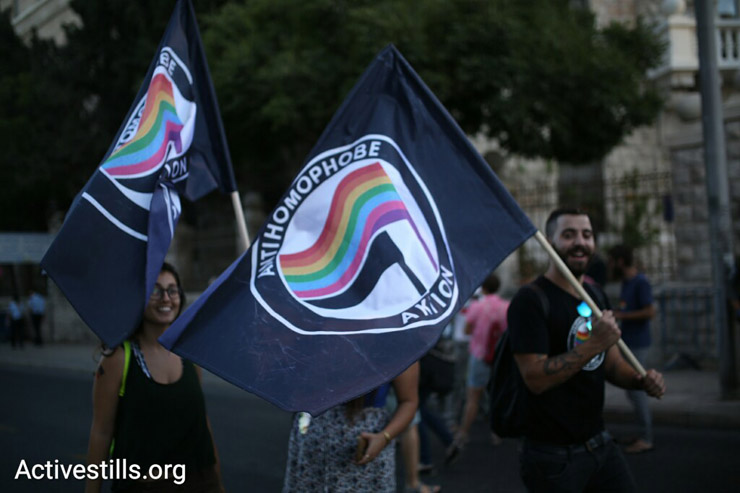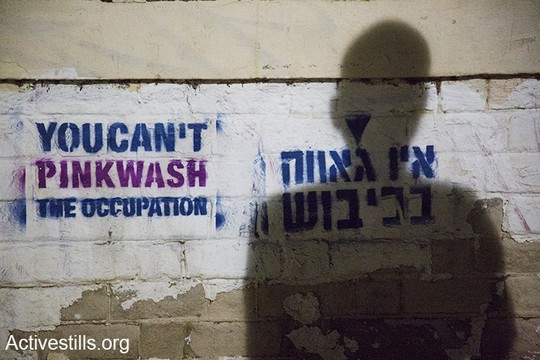Our community’s struggle is one for human and women’s rights. It is a struggle for liberation and justice. Those who support the oppression of another people are disparaging 100 years of struggle by women and LGBTQs.
By Alma Biblash

This past week saw the launch of a new project that calls to integrate women and LGBTQ Israeli into combat units in the IDF. A group of queer activists, myself included, decided to pay a visit to the launch party in order to protest against the use of our community and its resources to promote the oppression of others.
The event was organized on by “Blue-White Pride,” a movement of LGBTQ Israelis who serve in the security forces, as part of a new campaign to “double the number of women combat soldiers and soldiers who are out of the closet in the IDF, in order to maintain the IDF as a pluralistic and liberal army, that acts as a melting pot for the entire society.” The organization is planning on establishing an army prep group for queer teenagers.
Our community’s struggle is one for human and women’s rights. It is a struggle for liberation and justice. Those who, in the name of this struggle, support the systematic and cruel oppression of another people — which includes hundreds of thousands of LGBTQ Palestinians — disparages a century’s worth of struggle by women and LGBTQs, who paid with their bodies and their souls.
Watch: Queer activists disrupt pro-IDF conference in Tel Aviv
We sat among the crowd, and shortly after the beginning of the event began we waved a rainbow flag that read “No pride in occupation,” handed out flyers with information on how the IDF harms the security and freedom of women and LGBTQs (for instance, in how the army blackmails gay Palestinians to collaborate with Israel and pass along intelligence) and chanted that our community’s security cannot come at the expense of others.
In response, the crowd shouted at us that we were ruining the evening. That we are disrespectful. That we are bad lesbians. MK Stav Shaffir (Zionist Union), who purports to be friendly to the LGBTQ community, yelled that this is an “injustice to the community,” while MK Meirav Ben-Ari (Kulanu) shouted that there are enough conferences in support of the occupation in Tel Aviv that we can ruin. The organizers then removed us from the auditorium, some more forcefully than others.
Some of the organizers were open to discussion, speaking to us outside for quite a long time. Those discussions, however, were deeply frustrating. They insisted on ensuring a diversity of opinions, arguing that while we did not agree, it was okay to discuss the fact that we need to have an “inter-community discussion.” But this was not an inter-community discussion. I wasn’t there to practice my freedom of speech.
The choice to occupy and oppress is not a legitimate choice. It is not just another possibility that stands before us. Demolishing homes, shooting protesters, administrative detention, and maintaining a siege is not a right. Not even when the State of Israel views them as both a right and an imperative. The discussion that took place on Thursday in Tel Aviv is not an “inter-community” discussion — since millions of Palestinians were not represented.

The very fact that this project exists is a failure on the part of our community. We have the responsibility for our youth, many of whom are struggling to survive. Teenagers who very often suffer from discrimination, not only as LGBTQs, but also, for those who are not Ashkenazi, on the basis of their ethnicity. Because we have failed to create a real support system for them, they are resigned to look for support with the Israeli consensus, and the most powerful mechanism that allows social mobility in this country: the army.
No less important is the fact that the army — and not just the Israeli army — is a violent, masculine, and chauvinist institution. The likelihood that a gay or transgender teenager will experience violence, and especially sexual violence, in the army is probably far higher than in other places. We must not send our youth to the IDF, this is not how we will protect them. We will not encourage them to rot under homophobic commanders like Education Minister Naftali Bennett or sex offended such as Brig.-Gen. Ofek Buchris.
When prominent LGBTQ educational organizations, who do important and necessary work with teenagers, continue to view IDF enlistment as a worthy goal, we are in trouble.
Let’s support our teens, let’s invest our meager resources to show them that they do not need to buy into the stereotype of the brave Israeli in order to feel a part of something. Let’s show our youth that as a community that suffers oppression and violence, it can and must demand a change regardless of their willingness to serve in the army, and that they can refuse to take part in the violent oppression of others.
It is not easy to protest in front of an event put on by your community, but sometimes there is no choice.
Alma Biblash is a Tel Aviv-based activist and a blogger for Local Call, where this article was first published in Hebrew. Read it here.
